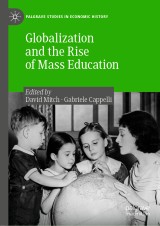Details

Globalization and the Rise of Mass Education
Palgrave Studies in Economic History
|
106,99 € |
|
| Verlag: | Palgrave Macmillan |
| Format: | |
| Veröffentl.: | 24.10.2019 |
| ISBN/EAN: | 9783030254179 |
| Sprache: | englisch |
Dieses eBook enthält ein Wasserzeichen.
Beschreibungen
<p></p><p></p><p></p><p>This edited collection explores the historical determinants of the rise of mass schooling and human capital accumulation based on a global, long-run perspective, focusing on a variety of countries in Europe, the Middle East, Asia, Africa and the Americas. The authors analyze the increasing importance attached to globalization as a factor in how social, institutional and economic change shapes national and regional educational trends. Although recent research in economic history has increasingly devoted more attention to global forces in shaping the institutions and fortunes of different world regions, the link and contrast between national education policies and the forces of globalization remains largely under-researched within the field.</p>
The globalization of the world economy, starting in the nineteenth century, brought about important changes that affected school policy itself, as well as the process of long-term human capital accumulation. Large migrations prompted brain drain and gain across countries, alongside rapid transformations in the sectoral composition of the economy and demand for skills. Ideas on education and schooling circulated more easily, bringing about relevant changes in public policy, while the changing political voice of winners and losers from globalization determined the path followed by public choice. Similarly, religion and the spread of missions came to play a crucial role for the rise of schooling globally.<p></p><p></p>
The globalization of the world economy, starting in the nineteenth century, brought about important changes that affected school policy itself, as well as the process of long-term human capital accumulation. Large migrations prompted brain drain and gain across countries, alongside rapid transformations in the sectoral composition of the economy and demand for skills. Ideas on education and schooling circulated more easily, bringing about relevant changes in public policy, while the changing political voice of winners and losers from globalization determined the path followed by public choice. Similarly, religion and the spread of missions came to play a crucial role for the rise of schooling globally.<p></p><p></p>
<p>Chapter 1: Introduction; Gabriele Capelli, David Mitch.- Part I: Global religious activity and schooling.-Chapter 2: Religion, colonialism and missions in Africa; Felix Meier zu Selhausen.- Chapter 3: The long legacy of missions in Latin America; Felipe Valencia.- Part II: Colonial legacies, local elites and schooling.- Chapter 4: Universal public schooling in colonial Korea and Taiwan; Sun Go.- Chapter 5: Racial exclusion and school development in Colombia; Irina Rosa España Eljaiek.- Part III: Global migrations and human capital accumulation.- Chapter 6: Brain drain, and brain gain in the age of mass migration: Italy and Ireland; Cormac Ó Gráda and Matteo Gomellini.- Chapter 7: Emigration and the development of schooling in Sweden; Johannes Westberg.- Chapter 8: German migration to Brazil and human capital accumulation; Bruno Witzel.- Part IV: Global forces and institutions in the era of mass education.- Chapter 9: Education in the U.S. as nationalist policy in a competitive global economy, 1876 – 1907; Nancy Beadie.- Chapter 10: Western-style education and schooling in China, 20<sup>th</sup> century; Pei Gao.- Chapter 11: Schooling and human capital in Iran; David Mitch. </p><br>
<p></p><p><b>David Mitch </b>is Professor and Chair of the Department of Economics at the University of Maryland, USA.<br> <br> <b>Gabriele Cappelli</b> is Assistant Professor at the Department of Economics and Statistics at the University of Siena, Italy.</p><p></p>
<p>This edited collection explores the historical determinants of the rise of mass schooling and human capital accumulation based on a global, long-run perspective, focusing on a variety of countries in Europe, the Middle East, Asia, Africa and the Americas. The authors analyze the increasing importance attached to globalization as a factor in how social, institutional and economic change shapes national and regional educational trends. Although recent research in economic history has increasingly devoted more attention to global forces in shaping the institutions and fortunes of different world regions, the link and contrast between national education policies and the forces of globalization remains largely under-researched within the field.</p>The globalization of the world economy, starting in the nineteenth century, brought about important changes that affected school policy itself, as well as the process of long-term human capital accumulation. Large migrations prompted brain drain and gain across countries, alongside rapid transformations in the sectoral composition of the economy and demand for skills. Ideas on education and schooling circulated more easily, bringing about relevant changes in public policy, while the changing political voice of winners and losers from globalization determined the path followed by public choice. Similarly, religion and the spread of missions came to play a crucial role for the rise of schooling globally.<p></p><p></p><p></p><p></p><p></p>
Sheds more light on the link between global forces and the rise of mass education Explores the connections between migration, governance and the international transmission of ideas, and mass schooling Examines diverse routes to schooling across the world
Diese Produkte könnten Sie auch interessieren:

Supply Chain Management: Models, Applications, and Research Directions

von: Joseph Geunes, Panos M. Pardalos, H. Edwin Romeijn

149,79 €















